
-
 Latam-GPT: a Latin American AI to combat US-centric bias
Latam-GPT: a Latin American AI to combat US-centric bias
-
Gauff dumped out of Qatar Open, Swiatek, Rybakina through

-
 Paris officers accused of beating black producer to stand trial in November
Paris officers accused of beating black producer to stand trial in November
-
Istanbul bars rock bands accused of 'satanism'

-
 Olympic bronze medal biathlete confesses affair on live TV
Olympic bronze medal biathlete confesses affair on live TV
-
US commerce chief admits Epstein Island lunch but denies closer ties

-
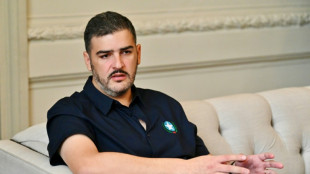 Mayor of Ecuador's biggest city arrested for money laundering
Mayor of Ecuador's biggest city arrested for money laundering
-
Farhan, spinners lead Pakistan to easy USA win in T20 World Cup

-
 Stocks mixed as muted US retail sales spur caution
Stocks mixed as muted US retail sales spur caution
-
Macron wants more EU joint borrowing: Could it happen?

-
 Shiffrin flops at Winter Olympics as helmet row simmers
Shiffrin flops at Winter Olympics as helmet row simmers
-
No excuses for Shiffrin after Olympic team combined flop

-
 Starmer says UK govt 'united', pressing on amid Epstein fallout
Starmer says UK govt 'united', pressing on amid Epstein fallout
-
Pool on wheels brings swim lessons to rural France

-
 Europe's Ariane 6 to launch Amazon constellation satellites into orbit
Europe's Ariane 6 to launch Amazon constellation satellites into orbit
-
Could the digital euro get a green light in 2026?

-
 Spain's Telefonica sells Chile unit in Latin America pullout
Spain's Telefonica sells Chile unit in Latin America pullout
-
'We've lost everything': Colombia floods kill 22
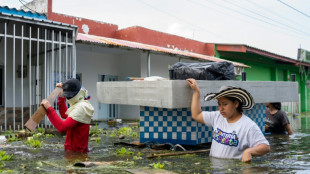
-
 Farhan propels Pakistan to 190-9 against USA in T20 World Cup
Farhan propels Pakistan to 190-9 against USA in T20 World Cup
-
US to scrap cornerstone of climate regulation this week

-
 Nepal call for India, England, Australia to play in Kathmandu
Nepal call for India, England, Australia to play in Kathmandu
-
Stocks rise but lacklustre US retail sales spur caution

-
 Olympic chiefs let Ukrainian athlete wear black armband at Olympics after helmet ban
Olympic chiefs let Ukrainian athlete wear black armband at Olympics after helmet ban
-
French ice dancers poised for Winter Olympics gold amid turmoil

-
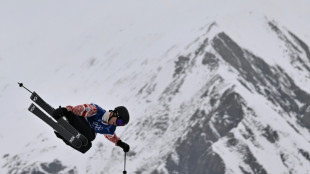 Norway's Ruud wins error-strewn Olympic freeski slopestyle
Norway's Ruud wins error-strewn Olympic freeski slopestyle
-
More Olympic pain for Shiffrin as Austria win team combined

-
 Itoje returns to captain England for Scotland Six Nations clash
Itoje returns to captain England for Scotland Six Nations clash
-
Sahara celebrates desert cultures at Chad festival
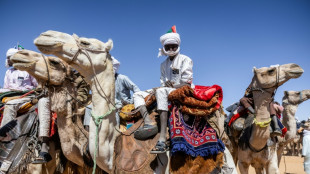
-
 US retail sales flat in December as consumers pull back
US retail sales flat in December as consumers pull back
-
Bumper potato harvests spell crisis for European farmers

-
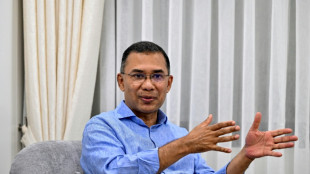 Bangladesh's PM hopeful Rahman warns of 'huge' challenges ahead
Bangladesh's PM hopeful Rahman warns of 'huge' challenges ahead
-
Guardiola seeks solution to Man City's second half struggles

-
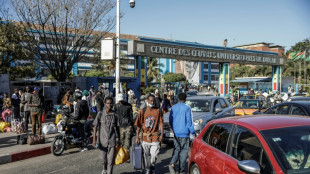 Shock on Senegalese campus after student dies during police clashes
Shock on Senegalese campus after student dies during police clashes
-
US vice president Vance on peace bid in Azerbaijan after Armenia visit

-
 'Everything is destroyed': Ukrainian power plant in ruins after Russian strike
'Everything is destroyed': Ukrainian power plant in ruins after Russian strike
-
Shiffrin misses out on Olympic combined medal as Austria win

-
 India look forward to Pakistan 'challenge' after T20 World Cup U-turn
India look forward to Pakistan 'challenge' after T20 World Cup U-turn
-
EU lawmakers back plans for digital euro

-
 Starmer says UK govt 'united', presses on amid Epstein fallout
Starmer says UK govt 'united', presses on amid Epstein fallout
-
Olympic chiefs offer repairs after medals break

-
 Moscow chokes Telegram as it pushes state-backed rival app
Moscow chokes Telegram as it pushes state-backed rival app
-
ArcelorMittal confirms long-stalled French steel plant revamp

-
 New Zealand set new T20 World Cup record partnership to crush UAE
New Zealand set new T20 World Cup record partnership to crush UAE
-
Norway's Ruud wins Olympic freeski slopestyle gold after error-strewn event
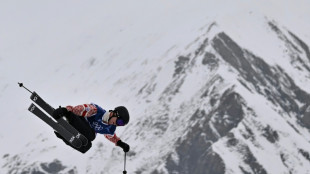
-
 USA's Johnson gets new gold medal after Olympic downhill award broke
USA's Johnson gets new gold medal after Olympic downhill award broke
-
Von Allmen aims for third gold in Olympic super-G

-
 Liverpool need 'perfection' to reach Champions League, admits Slot
Liverpool need 'perfection' to reach Champions League, admits Slot
-
Spotify says active users up 11 percent in fourth quarter to 751 mn

-
 IOC allows Ukrainian athlete to wear black armband at Olympics for war dead
IOC allows Ukrainian athlete to wear black armband at Olympics for war dead
-
AstraZeneca profit jumps as cancer drug sales grow


Indigenous writer Ailton Krenak, postponing the end of the world
The year was 1987, Brazil was just exiting a long military dictatorship, and Indigenous writer Ailton Krenak stood before the country's constitutional assembly in a pristine white suit, smearing black paint across his face.
"Indigenous peoples have watered every scrap of Brazil's eight million square kilometers with their blood," the handsome young activist defiantly told the assembly, using a traditional mourning ritual to protest centuries of violence against native peoples.
Thirty-six years after that memorable protest, which helped ensure the nation's new constitution protected native land rights, Krenak achieved what he calls a new "historic reparation" last month, when he was chosen as the first Indigenous member of the Brazilian Academy of Letters.
Founded in 1897, the Academy is the rough equivalent of France's hallowed Academie Francaise or Spain's Real Academia.
Seen as a standard-bearer of Brazilian language and literature, the Rio de Janeiro institution is made up of 40 members known as the "immortals," who hold their seats for life.
Known for its hushed halls and hallowed rituals -- its members convene for formal gatherings in gold-embroidered uniforms -- it is perhaps an unusual spot for life-long rabble-rouser Krenak, 70.
"We're going to bring a little noise to that century-old silence," the philosopher, writer and poet told AFP in an interview in Sao Paulo.
The Academy "has always been closed to native peoples and dominated by (Brazilian) Portuguese."
Krenak says he hopes to use his seat in the institution to help shine a spotlight on Brazil's nearly 200 Indigenous languages.
"Through language, literature and the arts, Indigenous cultures can be perceived as living things, not just something from the past," he says, speaking in calm but razor-sharp sentences.
Despite the horrors of the colonial past, "we are alive," he adds. "We won."
- In the flesh -
A member of the Krenak people of southeastern Brazil, whose surname he bears, the writer has lived the Indigenous struggle in the flesh.
His people were expelled from their land around 1970, during the dictatorship (1964-1985), forcing him and his family into exile.
At 18, he left for the southern state of Parana to study "the colonizer's language," earning a journalism degree. It is the language in which he writes his books.
After enduring torture and persecution by the military regime, the Krenak only partly recovered their lands with the return to democracy. Their 600 remaining members were scattered across several states.
Krenak's own fight is rooted in their suffering.
Considered one of Brazil's leading Indigenous intellectuals, he has written a highly regarded body of work criticizing colonialism and capitalism, including the critically acclaimed essay "Ideas to Postpone the End of the World" (2019), translated into more than 10 languages.
The Indigenous leader, who is discreet on his personal life, married fellow activist Irani Krenak in 2000. They had three children, one of whom died in an accident. Another daughter from a previous relationship also died.
- Different vision -
Krenak rejects the notion that European colonizers brought "civilization" to the Americas.
In fact, they brought a way of life that divorced humankind from nature, leading to a world where corporations "devour forests, mountains and rivers," he writes.
Krenak proposes a different way of life, akin to that of the native communities who resisted colonialism, fiercely clinging to their land.
About four years ago, he moved to his people's land on the banks of the Rio Doce river, home to around 350 Indigenous people.
But even there, what he calls the "corporate monster" is inescapable. A case in point: a notorious mine dam collapse in 2015 that caused an environmental disaster on the river, a vital source of water and food for his people.
The accelerating destruction of nature affects everyone, Krenak says.
"It's not just Indigenous peoples who are threatened by the damage anymore. Now white people are, too," he says, wearing a striped shirt and traditional feather necklace.
For now, he says, he is "biding (his) time" hoping for political and social change.
But in the end, he says, he expects the Earth to move beyond humankind.
"My hope is that we'll be discarded as quickly as possible so the planet can continue its magnificent journey."
D.Khalil--SF-PST


